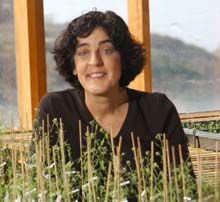Articles and reports from the Life Sciences and chemistry area deal with applied and basic research into modern biology, chemistry and human medicine.
Valuable information can be found on a range of life sciences fields including bacteriology, biochemistry, bionics, bioinformatics, biophysics, biotechnology, genetics, geobotany, human biology, marine biology, microbiology, molecular biology, cellular biology, zoology, bioinorganic chemistry, microchemistry and environmental chemistry.

A study published today by Glasgow University scientists shows that finches given a poor diet briefly in early life become adults that can’t cope with ageing. Birds that had a low quality diet for just two weeks grew into adults with much lower levels of antioxidants in their blood, and such birds have shorter lives.
Antioxidants are a key part of the body’s defences against ageing; they reduce the damage caused by free radicals that are produced during normal metabolism. Animals cannot make

Salk scientists have defined a new pathway that controls how plants flower in response to shaded, crowded conditions, and their findings may have implications for increasing yield in crops ranging from rice to wheat.
The study, published in the June 19 issue of Nature, was led by Salk professor and Howard Hughes Medical Institute Investigator Joanne Chory and Salk/Howard Hughes Medical Institute postdoctoral fellow Pablo Cerdán. “The mechanism that leads to plants flowering early in respons

While picking apart the genetic makeup of the plant Arabidopsis, two Dartmouth researchers made a startling discovery. They found that approximately 36 percent of its genome is potentially regulated by the circadian clock, which is three and a half times more than had previously been estimated.
The study, which appears in the June issue of Plant Physiology, was conducted by C. Robertson McClung, Dartmouth professor of biological sciences, and Todd Michael, a former Dartmouth graduate studen

Researchers at the University of Pittsburgh have completed the first survey of the entire human genome for genes that affect the susceptibility of individuals to developing clinical depression.
George S. Zubenko, M.D., Ph.D., professor of psychiatry at the University of Pittsburgh School of Medicine and adjunct professor of biological sciences at Carnegie Mellon University and his team have located a number of chromosomal regions they say hold the genetic keys to a variety of mental illness

USC researchers have moved one step closer to understanding how the body fights harmful antigens – foreign molecules that trigger an immune response.
The team successfully simulated a mutation process that diversifies the proteins, or antibodies, responsible for immunity – a phenomenon known as somatic hypermutation. This process enables the body to fight off a wide range of diseases.
Their findings are detailed in the July 3 issue of the journal Nature.
“When performin

Madrid, Spain: Scientists believe that they are an important step nearer to success in creating an artificial egg from the combination of the nucleus of a somatic cell and an oocyte which has had its DNA-carrying nucleus removed, a conference of international fertility experts heard today (Tuesday 1 July).
Dr Peter Nagy, from Reproductive Biology Associates, Atlanta, collaborating with the University of Connecticut, USA, told the European Society of Human Reproduction and Embryology annual